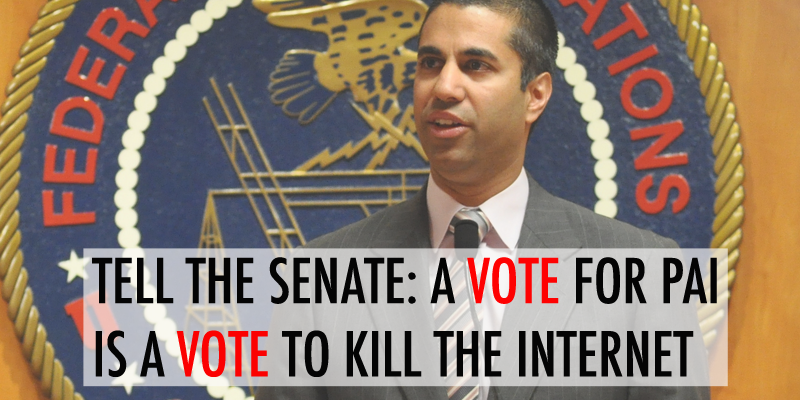
Net neutrality advocacy group Free Press is gathering signatures on a petition to "fire" Federal Communications Commission Chairman Ajit Pai, who needs a re-confirmation vote from the Senate in order to continue serving on the FCC.
The Senate's Republican majority will almost certainly ensure that Pai gets a new term. But Free Press's petition likely won't go unheeded by Democratic senators, who plan to criticize Pai's positions on net neutrality and broadband consumer privacy rules before the Senate vote.
The Free Press petition, available here, says that "[t]he Senate needs to stand up for what's right and fire FCC Chairman Ajit Pai." Free Press, which says it collected 10,000 signatures on the petition in 24 hours, wrote:
Since he joined the Commission, he's worked to undo policies designed to protect Internet users, communities of color and poor people. While he's supposed to protect the public interest, he's continuously voted against it and sided with the deep-pocketed corporations—like Verizon—that once employed him.
He's failing at his job. And that means we need the Senate to fire him. And we have an opportunity. The Senate has to vote to re-confirm Pai by the end of the year or he's out.
Here's what that means for us: We can get every single member of the Senate on the record about Net Neutrality and a whole lot more.
The petition called out Pai's plan to overturn the commission's net neutrality rules and the FCC's likely approval of the right-wing Sinclair Broadcast Group's acquisition of Tribune Media Company. Free Press also said a vote for Pai is a vote to "Shut off phone and Internet service for people who are struggling," perhaps a reference to a Pai decision that made it more difficult for companies to provide subsidized broadband to poor people through the FCC's Lifeline program.
Pai is a critic of Free Press's positions on net neutrality and other issues. When Pai announced his plan to overturn net neutrality rules in April, he singled out Free Press as "a spectacularly misnamed Beltway lobbying group" that wants the government to "assume control of the Internet" and restrict free speech.
Pai and Free Press have disagreed about whether net neutrality rules are harming broadband network investment. Free Press has pointed out that ISPs themselves say that the rules haven't affected investment. Last week, it argued that "Chairman Pai continues to hide the truth about broadband investment to justify his vendetta against net neutrality."
We asked Pai's office today if he has any response to the Free Press petition or the group's most recent statement about broadband investment, but a spokesperson for Pai declined comment.
Democrats fight re-confirmation
Pai's first term on the FCC technically expired in June 2016, but the FCC's rules allow him to stay until the end of 2017. President Donald Trump, who appointed Pai to the chairmanship, nominated Pai for a new five-year term retroactive to July 1, 2016.
A Senate vote on Pai's re-confirmation could come as soon as this week, Politico reported today. Although Republicans would like to push the vote through quickly, Democrats will try to hold it up long enough to detail their opposition to Pai's policies.
“We’re going to be very loud about it,” Sen. Maria Cantwell (D-Wash.) told Politico. Sen. Ed Markey (D-Mass.) said, "This debate on net neutrality, on privacy, is at a defining historical moment, and we have to ensure there is a full public debate so everyone can understand its importance.”
While unlikely, the FCC would be temporarily left with a 2-2 deadlock between Republicans and Democrats if Pai had to leave the commission. Trump would be able to nominate a replacement and the Senate would decide whether to confirm the nominee to fill the empty slot. While all five commissioners must be approved by the Senate, the president alone decides which of the five serves as chair.
reader comments
104